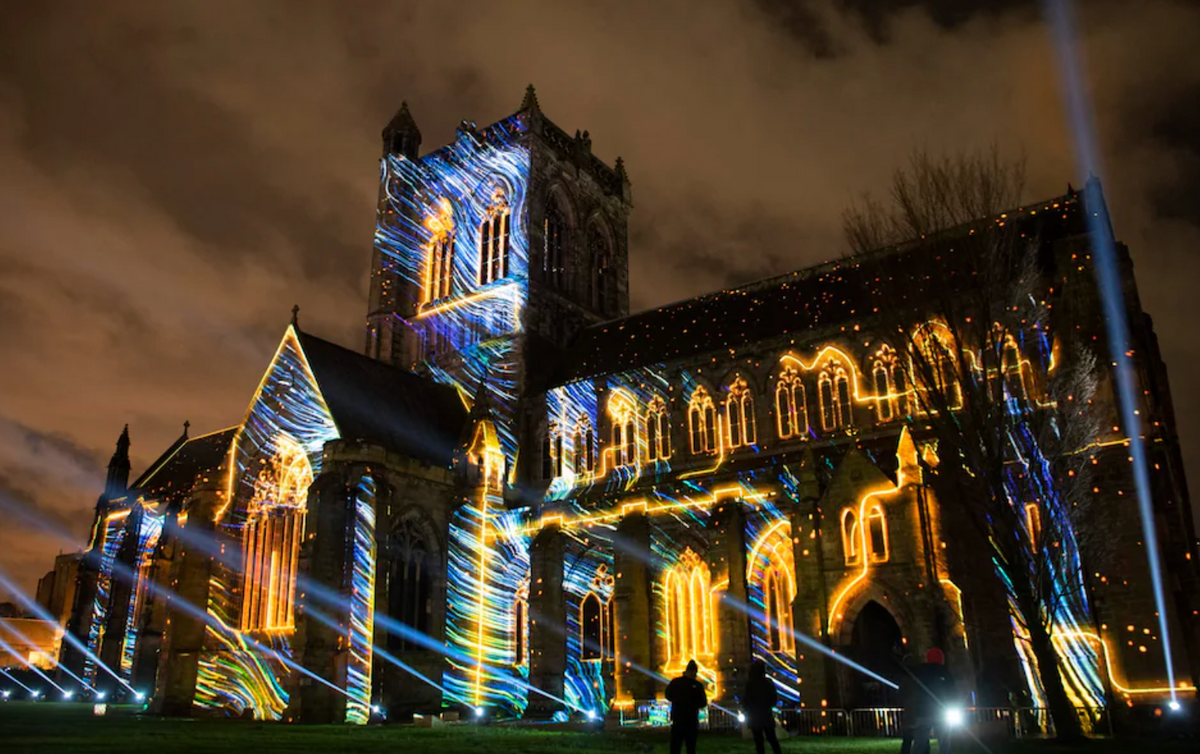A UK Parliamentary committee has criticised the Unboxed post-Brexit culture festival, calling the £120m governmental investment in the initiative “an irresponsible use of public money”. A report published 16 March by the Commons culture, media and sport committee also warned that it is ‘far from clear that [Unboxed] will deliver a return on investment”.
The UK-wide festival known as Unboxed: Creativity in the UK, first announced by former prime minister Theresa May in 2018, launched in Scotland with About Us earlier this month, a spectacular free open-air event using the historic Paisley Abbey near Glasgow as the canvas for a dramatic immersive history projection.
When the project was first announced in 2018, it was dubbed the Festival of Brexit and met with scepticism. In late 2020, applicants were invited to form Creative Teams and apply to a £3.6m-funded research and development programme for the initiative. Thirty teams were then selected and awarded £100,000 each to originate ideas. During the last phase, ten large-scale projects were commissioned, forming part of the final festival programme.
Unboxed was previously known as Festival*UK 2022. The culture committee report subsequently criticises the festival name, saying: “Given that the event’s name and full creative programme were not announced until October 2021, some three years after the idea was formed but just six months before it begins, we questioned whether people understand the vision for Unboxed, or even know that it is happening.”
The committee chair, MP Julian Knight, adds in a statement: “The Unboxed festival acts as a prime illustration of an event with aims that have been vague from the start. That it took three years to come up with a rather nebulous name, which will mean little to the few that are even aware of its existence, does not bode well for its chances of delivering a true lasting legacy.” The report recommends that “the government must be clear about what it is trying to achieve through major events and how they fit with wider policy priorities, and then to embed that vision through long-term planning and resourcing.”
The Art Newspaper understands however that evidence to the select committee was heard before the ten final projects had been announced. Crucially, the festival is also supported by the UK’s four governments. “The fact we have a Welsh, Scottish, and Northern Irish team is the product of the devolved nature of commissioning culture in the UK. When we went in with the idea, we got a universal yes from all four governments, which is magic,” says Martin Green, the festival’s chief creative officer.
The UK Department for Digital, Culture, Media and Sport (DCMS) says that it disagrees with the committee's findings. “The UK has a strong history of hosting incredible international events that deliver huge benefits for the nation, creating jobs and increasing investment in towns and cities across the country,” it adds. A government source adds that the £120m investment is also helping to create jobs and commissions for those working in industries impacted by the Covid-19 pandemic.
Green adds in a statement: “Unboxed opened in Paisley on 1 March with an overwhelmingly positive public response, underpinning a commitment to bring large-scale cultural programming to places often underserved. From unique audience experiences to a UK-wide schools programme, we are confident that Unboxed will demonstrate lasting value to people throughout the UK.”
About Us, which is now in Derry-Londonderry (15-21 March), is the first of ten "multi-site and digital creative projects" taking place across the country. The free programme of events brings together key figures in science, technology, engineering, mathematics and the arts “on TV, on radio and online”.
Future events include SEE MONSTER, a public art installation housed on a decommissioned North Sea oil rig to be unveiled in the coastal town of Weston-super-Mare this summer (launching 7 July). Meanwhile, the “living history” project StoryTrails, a “breathtaking deep dive into our collective histories”, will take place in 15 towns and cities culminating in a new film by the historian David Olusoga premiering at the London Film Festival in October.


